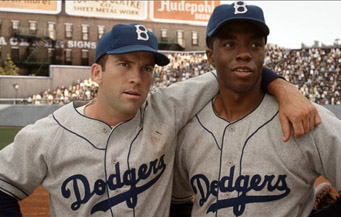The 400-Word Review: 42
By Sean Collier
April 14, 2013
BoxOfficeProphets.com

42 stars Chadwick Boseman as Robinson, Harrison Ford as Brooklyn Dodgers manager Branch Rickey and Nicole Beharie as Robinson’s wife, Rachel. Covering everything from Robinson’s days in the Negro Leagues to the Dodgers’ pennant-winning 1947 season, 42 aims to compact the bulk of Robinson’s struggle into a two-hour film.
Its efforts are entertaining, and well-crafted. All the performances are worthy of their historical sources; in a large cast of supporting characters, Andre Holland’s turn as Pittsburgh Courier writer and Robinson confidant Wendell Smith stands out. 42 is also a remarkable picture of 1940s baseball, with details of ballparks and ballplayer life lovingly recreated.
As an introduction to Robinson’s life, presenting the bare facts (with selected illustrations) of what he endured and did, it serves its purpose. Perhaps 42 is aimed most directly at young viewers who aren’t familiar with Robinson’s story; for those viewers, it will serve as a nice introduction. (And for baseball diehards, the aforementioned attention to detail will please.)
Unfortunately, that leaves a lot of people unrepresented — namely, those who are aware of Robinson and his achievement but are unaware of the scope of his struggles. The unimaginable violence, hatred and abuse Robinson suffered for an extended period of his career are presented here as vignettes of discrimination, all easily solved. Phillies manager Ben Chapman hurls a racist diatribe at Robinson from the dugout, so Rickey settles Robinson down while a teammate gets in Chapman’s face. Pirates pitcher Fritz Ostermueller plunks Robinson, but a Band-Aid and a home run later, Jackie’s feeling fine.
It’s a tough line to walk, and admittedly, 42 spends most of its time on scenes like this. Unfortunately, they’re reductive; by presenting Robinson’s trials as episodic scenes, 42 avoids confronting the sustained, long-term nature of the problem. Furthermore, an afterward shows little but Robinson smiling with black players that followed in his footsteps and contemporary major-leaguers wearing the number 42 in ode to him; sadly, winning the pennant in 1947 did not cure American racism.
The flaw is structural. By attempting to tell the full story of Robinson’s life in a neat three-act structure, there’s no alternative but a CliffsNotes version of the story. 42 is good; a film that tackled the project from a radically different angle would’ve, undoubtedly, been better.
Sean Collier is the Associate Editor of Pittsburgh Magazine and a member of the Broadcast Film Critics Association. Read more from Sean at pittsburghmagazine.com/afterdark